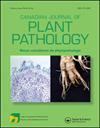Application of plant growth-promoting rhizobacteria combined with compost as a management strategy against Verticillium dahliae in tomato
IF 1.5
4区 农林科学
Q3 PLANT SCIENCES
引用次数: 5
Abstract
Abstract This study aimed to evaluate the effect of plant growth-promoting rhizobacteria (PGPR) and compost, applied alone or in combination, on tomato resistance to vascular wilt caused by Verticillium dahliae. Improved management of vascular wilt is important for enhanced productivity of greenhouse-grown susceptible tomato plants. The application of compost and PGPR resulted in a reduction in infection parameters compared with untreated plants inoculated with the pathogen, as well as activation of plant defence mechanisms. In the presence of the pathogen, compost application significantly improved the total fresh and dry weights by 97% and 71%, respectively, compared with pathogen-inoculated controls. The combination of compost with PGPR significantly increased chlorophyll fluorescence and stomatal conductance compared with the infected-control. In addition, the combination of compost and PGPR reduced the accumulation of stress markers such as malondialdehyde and hydrogen peroxide by 48% and 77%, respectively, and promoted the activity of antioxidant enzymes. Fruit yield and quality were also significantly improved relative to the control. The results suggest that compost applied alone or in combination with PGPR helps to suppress vascular wilt and to improve the yield and quality of tomatoes.植物生长促进根际细菌与堆肥联合防治番茄黄萎病菌的研究
摘要本研究旨在评价促生根瘤菌(PGPR)和堆肥单独或联合施用对番茄抗大丽花黄萎病的影响。改善管束枯萎病的管理对提高温室栽培番茄易感植株的产量具有重要意义。与未处理植株相比,施用堆肥和PGPR降低了侵染参数,并激活了植株的防御机制。在病原菌存在的情况下,与接种病原菌的对照相比,施用堆肥显著提高了总鲜重和总干重,分别提高了97%和71%。与对照相比,堆肥与PGPR配施显著提高了叶绿素荧光和气孔导度。此外,堆肥与PGPR组合处理可使胁迫标志物丙二醛和过氧化氢的积累分别减少48%和77%,并提高抗氧化酶的活性。果实产量和品质也较对照显著提高。结果表明,堆肥单独施用或与PGPR联合施用均能有效抑制番茄血管性枯萎病,提高番茄产量和品质。
本文章由计算机程序翻译,如有差异,请以英文原文为准。
求助全文
约1分钟内获得全文
求助全文
来源期刊
CiteScore
4.50
自引率
5.00%
发文量
56
审稿时长
6-12 weeks
期刊介绍:
Canadian Journal of Plant Pathology is an international journal which publishes the results of scientific research and other information relevant to the discipline of plant pathology as review papers, research articles, notes and disease reports. Papers may be submitted in English or French and are subject to peer review. Research articles and notes include original research that contributes to the science of plant pathology or to the practice of plant pathology, including the diagnosis, estimation, prevention, and control of plant diseases. Notes are generally shorter in length and include more concise research results. Disease reports are brief, previously unpublished accounts of diseases occurring on a new host or geographic region. Review papers include mini-reviews, descriptions of emerging technologies, and full reviews on a topic of interest to readers, including symposium papers. These papers will be highlighted in each issue of the journal and require prior discussion with the Editor-in-Chief prior to submission.

 求助内容:
求助内容: 应助结果提醒方式:
应助结果提醒方式:


